In 2014, when we talk about Senate Minority Leader Mitch McConnell (R) struggling to connect with voters, we're generally referring to residents of Kentucky. But there are some other notable voters likely causing McConnell some heartburn: the senators who'll vote for the Senate's party leadership in January.
Consider the debate in Georgia over the weekend for the GOP Senate candidates.
At the close of Saturday night's U.S. Senate Republican debate [the Atlanta Journal Constitution's] Jim Galloway asked the seven hopefuls on stage: Would you support Mitch McConnell as GOP leader, whether in the minority or majority? The Kentuckian was not warmly embraced. Businessman David Perdue: "My answer is no." Former Secretary of State Karen Handel: "Absolutely not. We need new leadership with new people there."
Of the seven candidates on the stage, the only one who committed to supporting McConnell was Art Gardner, a largely unknown patent attorney who has no credible chance of winning.
As a practical matter, it's easy to imagine some of these candidates changing their mind in early 2015, especially if McConnell prevails in Kentucky. Once they're a part of the Senate Republican team, and their colleagues rally behind their long-time leader, chances are, rookie senators will want to go along and get along.
But the fact remains that this has quietly become a litmus-test issue in a variety of GOP primaries: there's suddenly an expectation in much of the country that true conservative Senate candidates will distance themselves from Mitch McConnell now as a way of impressing Republican voters.
It's not just Georgia. In Louisiana's Senate race, the leading Republican is Rep. Bill Cassidy, who was recently asked who he'd support for his party's Senate leader if elected. "I don't know who's running." Cassidy replied.
There are three competitive GOP candidates in Oklahoma's Senate primary, and each of them have declined to back McConnell if elected.
In Nebraska, leading up to the Republican primary, Ben Sasse aired ads blasting McConnell as a way of demonstrating his far-right bona fides, though he later said he'd be a "team player" if both he and McConnell win in November.
I can't recall a modern precedent for this dynamic in either party -- Senate candidates in a variety of states not only talking about leadership elections on Capitol Hill, but proactively distancing themselves from their party's own current leader.
For McConnell, who's eager to remind his own constituents about his uniquely influential post in Washington, this must be at least a little heartbreaking.
For that matter, given the scope of the skepticism from his own party's candidates, one might think McConnell is some kind of RINO ("Republican In Name Only"), who's constantly working with Democrats to advance popular legislation. In practice, McConnell is the exact opposite -- the senior senator from Kentucky has taken blanket obstructionism to levels unseen in American history, effectively killing the institution's governing capacity.
